Getting behind youth in the fight against HIV/AIDS in Nigeria
By Chinyere AmobiPublished: March 6, 2019

In September 2018, Dr. Juliet Iwelunmor of Saint Louis University in the U.S. received a $2.3 million NIH grant to expand youth-friendly HIV self-testing in Nigeria. Currently, Nigerian youth represent more than ten percent of the HIV youth burden worldwide. As a country, Nigeria ranks second in the world in new HIV infections among youth, behind only South Africa. In this interview, Dr. Iwelunmor shares how she’s curating a youth run movement towards knowing your status, with young people taking the lead in devising their own interventions towards an AIDS-free generation.
In what ways is the current fight against HIV/AIDS not youth-friendly?
In public health, we create lots of guidelines and programs that say that we need young people at the center of this fight, but in reality, they’re rarely given that space.
You don’t see space for young people’s designs and ideas. Usually it’s passive and they’re something like youth ambassadors or on advisory boards, but the idea of them actually carrying out ideas in the field never happens.
We wrote a very competitive grant that said you could potentially use crowdsourcing and entrepreneurship to generate ideas from young people on how to promote self-testing.
Our goal is to have young people carry out the solutions, not us. They know what would be acceptable to their peers. We can then combine their ideas with their talents and skills, to build that sense of agency that allows them to bring those solutions to life. Then, they go test it out in the field, to see if their ideas can help their peers overcome those barriers to testing.
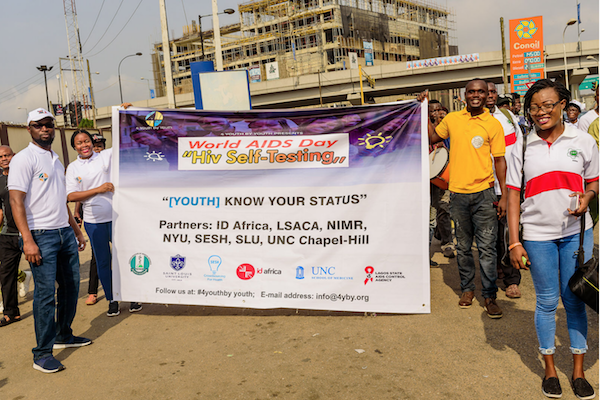
What led you to choose Nigerian youth as the topic for your research?
Over four decades of researching into the epidemic, if there’s one group that continues to be left behind in terms of reduction of HIV/AIDS, it’s young people. Particularly, there’s one region left behind in the global response: West and Central Africa.
In terms of global HIV burden among adolescents, Nigeria ranks second after South Africa. Clearly, we have a problem, and we’re not doing everything we can for the people who deserve the right to have an AIDS free future.
It’s the global target that by 2030 we’ll have an AIDS free generation. But you can’t achieve those goals if you’re not targeting everybody equally, which is why we focused our research on youth, and made Nigeria our location.
About 3.2 million people are living with HIV in Nigeria. Among that number, 230,000 are youth. If you think globally in terms of how much money has been spent to fight the disease, it’s ridiculous that we still can’t get to a sustainable intervention.
Our research is saying enough is enough: we need to bring more people to the forefront of the conversation, especially those most affected by it. We need youth to be at the table leading solutions that matter to them.
That means not being passive in terms of how you work with young people to address HIV, but encouraging their active participation in creating ideas and proposing solutions that will resonate with themselves and other young people.
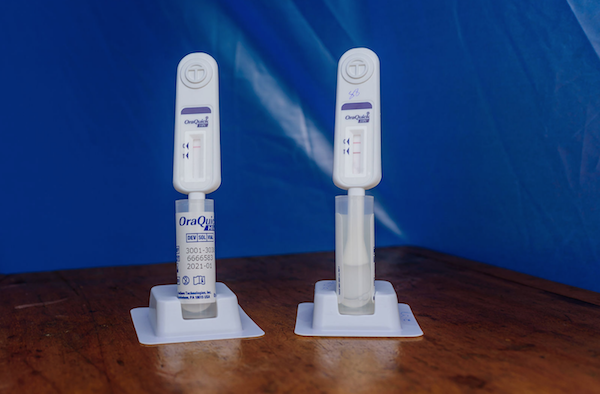
How did self-testing become the focus of your approach?
In 2018, the UN and WHO’s guidelines recommended HIV self-testing as an additional or complimentary approach to the regular facility-based testing. Self-testing allows you to collect your own specimens, whether oral or blood, in private to find out your results, taking the power of testing away from clinics and giving that autonomy back to people.
Our research explores how we can create demand for self-testing among young people. Not in the sense of how can we push the idea onto them: we want the idea to be pulled out from them. So, we’re using crowdsourcing and open challenges to pose back to young people how we might promote self-testing among them.
Tell us more about the ideas challenge Nigerian youth held on World AIDS Day
The idea to make our event a World AIDS Day activity came from the youth. It made sense to them, having young people join the clarion call on that day, with the theme of Know Your Status. It was empowering to see them take the stage at the Police Training College in Ikeja, Nigeria and defend their ideas, to convince people that their ideas were worth carrying out.
The top winner proposed doing self-testing in the same venues that people recharge cars. Also, with mobile technology as the next big thing, harnessing the potential that exists around the places where people go and get data for their phones, and turning them into depots for health, particularly HIV.
The runner up created an app where young people can connect with each other if they test on their own, maybe to share the results with trained professionals through the app.
The third idea proposed making toiletry packages for self-testing as part of a hygiene kit for men, and perhaps a grooming kit for women. The next phase now is to work with these youth and other participants on prototypes to expand their ideas and bring them to life.
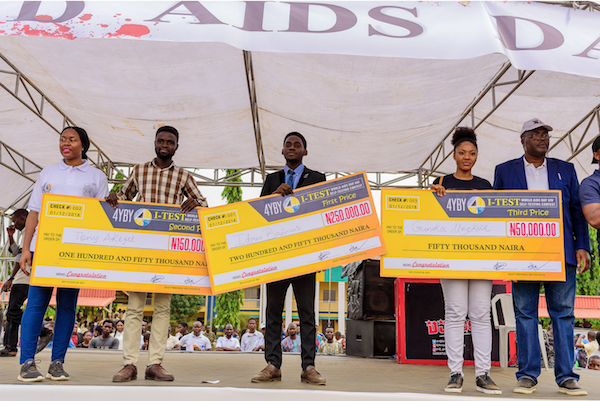
How did you reach out to youth for the ideas challenge?
We partnered with folks like ID Africa and Pin Point Media. They were phenomenal: they’re the folks that worked with MTV Sugah in Nigeria, so they already had a base knowledge of how to reach young people through media.
After our youth told us what they needed, such as more knowledge of what self-testing was, together with IB Africa and Ten Point Media we began to blast social media sites explaining what self-testing was, advertising everywhere about the World AIDS Day Challenge as a place where youth could share ideas.
Youth ambassadors also went to schools to talk about the challenge, and over the span of a month we had about 903 entries and were able to select the top three on World AIDS Day.
We had to think of a name that signified what we were doing. We created this platform from a grant, but we never wanted to forget that it’s for young people leading young people. So, we chose the name 4 Youth By Youth, knowing it could be a clarion call, and I think it has resonated with them.
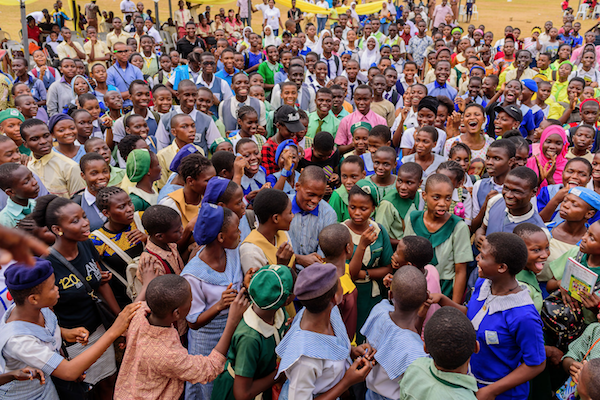
What are the next steps for the research?
The Designathon will be held March 29-31 in Lagos. Once the Designathon happens, the entrepreneurship training phase will begin. The top three, after they’ve prototyped and designed their ideas, will learn the basics of entrepreneurship and research and what’s expected of them when they go into the field. Then they’ll pitch again, and the top three finalists will go to the field to pilot their ideas.
For six months, they’ll be in the field with resources that we’ll provide for them to carry out their ideas to increase the demand for self-testing. Then we get to see which one was most impactful.
What would have to happen for you to judge this program as a success?
We can’t continue leaving young people behind. Our argument is that if you empower young people to find solutions, and partner with them to ultimately lead those solutions, they can help the country achieve its goals in fighting HIV and AIDS.
We hope to have youth entrepreneurs that are able to go into the field and through the ideas that they created be able to cause an uptake in young people testing and knowing their status, with young people completely leading the way.
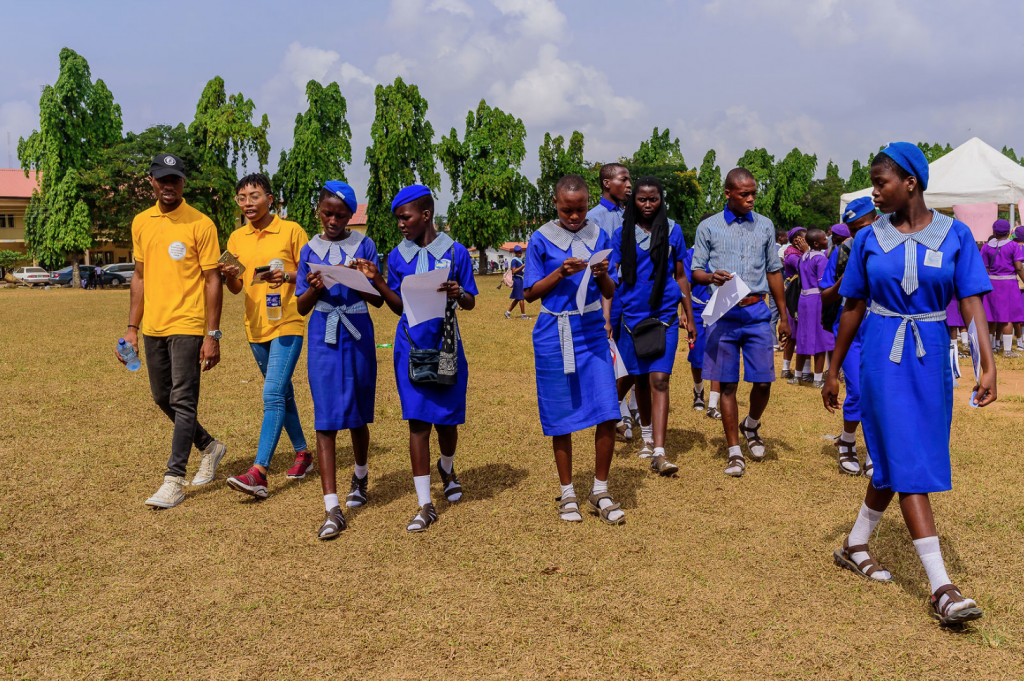
Additional partnering institutions on the grant include the Nigerian Institute for Medical Research, University of North Caroline, Chapel Hill, and New York University School of Medicine
This study is supported by the National Institute of Health, Eunice Shriver Institute of Child Health and Human Development. Like what you're reading? Sign up for our free newsletter and never miss a post! Plus get a FREE digital version of our Issue No.10 with sign up.
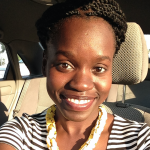
- Black Women Share Their Experiences with High Blood Pressure - September 24, 2021
- Breast Cancer Survivor VeRitta Smith on Self Care And Finding Purpose in the Midst of the Storm - February 13, 2019
- Filmmaker Adeyemi Michael Reimagines the Immigrant Narrative While Paying Tribute to His Mother in the Captivating Short Film, “Entitled” - May 8, 2019
- For Us, By Us: BLK + GRN Puts Natural Care Products for Black Women on the Map - May 2, 2019
- Flying Over 50: How Pole Dancing Helped 58-year Old Makeda Smith Reclaim Her Life - January 16, 2019
- Playwright Ngozi Anyanwu taps into her Nigerian-American upbringing for a play on grief and healing - October 19, 2018
- Cameroonian filmmaker Cyrielle Raingou on her upcoming documentary and her country on the brink of civil war - November 7, 2018
- Are Women ‘Hormonal?’ Yes, And So Is Everyone Else! - May 23, 2019
- How The All of Us Research is Restoring Trust and Bringing A Much-Needed Diversity to Medical Research - April 10, 2019
- Getting behind youth in the fight against HIV/AIDS in Nigeria - March 6, 2019












